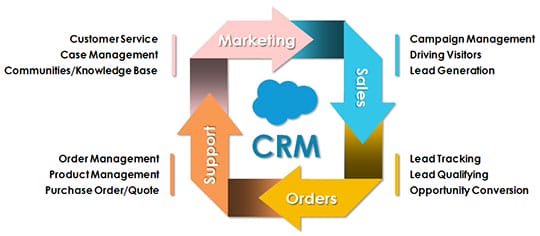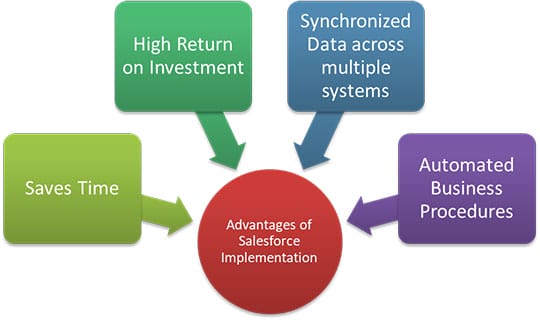“A good idea is about ten percent and implementation and hard work is 90 percent”. – Guy Kawasaki
The statement holds true for almost everything, Salesforce too. There is not even an ounce of doubt regarding what a brilliant technology it is. However, it remains of little or no use till the time it is properly integrated and implemented with your business model. In this blog, we are here to guide you through the key steps you need to take to decide the future of Salesforce project in your organization.
Over the previous decade, Salesforce has been a standout amongst the most vigorous and prominent platforms on the CRM advertise. In addition to this, the CRM solution has acquired in excess of 1,000 companies who have deployed Salesforce and the size of these organizations range from the new businesses to Fortune 100 companies. Let us take a look at the advantages of Salesforce implementation before we actually move on to the steps of implementation.
Recommended for you: Rich Salesforce Mobile Application Development Platforms.
8 key aspects of Salesforce Implementation
Salesforce implementation is very tricky to accomplish and that is why you need to be extra careful while implementation is happening. Here are some key aspects that you should necessarily take into consideration while planning your Salesforce implementation.

1. Create a blueprint
 Plan your implementation. Create a blueprint of the things that you want and the goals that you wish to achieve. Outline all the essential implementation responsibilities and estimate their timeline. Take a pen and jot down everything that has to happen in order to reach the objectives and other things defined in your blueprint.
Plan your implementation. Create a blueprint of the things that you want and the goals that you wish to achieve. Outline all the essential implementation responsibilities and estimate their timeline. Take a pen and jot down everything that has to happen in order to reach the objectives and other things defined in your blueprint.
2. Implement in bits and pieces
 Many experts have suggested that you can either implement everything in one small department or buy small or limited versions and licenses for a given department so that you can first optimize Salesforce within this small trial group and then move on to expand it across the entire business channel enterprise.
Many experts have suggested that you can either implement everything in one small department or buy small or limited versions and licenses for a given department so that you can first optimize Salesforce within this small trial group and then move on to expand it across the entire business channel enterprise.
3. Evaluate and hire a Salesforce Implementation Partner
 Implementing Salesforce is very complex and is quite capable of easily getting you derailed. An implementation partner and his team will dedicate around the clock focus to accelerate your vision, from a mere concept to a bright reality, and this provides you with a good leadership as well as process management after your Salesforce implementation goes live.
Implementing Salesforce is very complex and is quite capable of easily getting you derailed. An implementation partner and his team will dedicate around the clock focus to accelerate your vision, from a mere concept to a bright reality, and this provides you with a good leadership as well as process management after your Salesforce implementation goes live.
4. Educate your team.
 Salesforce is new and technical. You cannot just expect your team to be at the pace with it right from the beginning. This gap between Salesforce and your team can lead to a huge shortfall in the entire business system. Therefore it is necessary for you to train and educate your team about the changes that would follow right from the initiation of the very first steps of implementation.
Salesforce is new and technical. You cannot just expect your team to be at the pace with it right from the beginning. This gap between Salesforce and your team can lead to a huge shortfall in the entire business system. Therefore it is necessary for you to train and educate your team about the changes that would follow right from the initiation of the very first steps of implementation.
5. Allocate and define responsibilities
 For a successful and productive implementation, you need to allocate clear-cut responsibilities. Make a chart, circulate it within your team networks. Implementation is tricky as well lengthy. Therefore, it is important for an enterprise to continue running its operations in the front end whereas Salesforce implementation goes on in the back end.
For a successful and productive implementation, you need to allocate clear-cut responsibilities. Make a chart, circulate it within your team networks. Implementation is tricky as well lengthy. Therefore, it is important for an enterprise to continue running its operations in the front end whereas Salesforce implementation goes on in the back end.
6. Plan to handle Updates
 The secret of Salesforce’s success is that it is periodically updated. Salesforce releases triannual updates which mean that you get new features three times in a given year. This is why you need to have a plan of action to handle these updates because you may or may not want all the features of the update. Whenever the new releases come out, you need to prioritize what all characteristics can be most useful for your particular business model.
The secret of Salesforce’s success is that it is periodically updated. Salesforce releases triannual updates which mean that you get new features three times in a given year. This is why you need to have a plan of action to handle these updates because you may or may not want all the features of the update. Whenever the new releases come out, you need to prioritize what all characteristics can be most useful for your particular business model.
7. Communicate key changes
 The key to a good Salesforce implementation is communicating all the key changes to all the teams in your company. At any cost do not make the mistake of assuming that they’ll see the crucial changes and also execute them accordingly. Use your company’s regular communication channels or interactive sessions to effectively and clearly communicate all the key changes, by explaining why they were necessary, why they have been made and how they are required to adjust their Salesforce workflow.
The key to a good Salesforce implementation is communicating all the key changes to all the teams in your company. At any cost do not make the mistake of assuming that they’ll see the crucial changes and also execute them accordingly. Use your company’s regular communication channels or interactive sessions to effectively and clearly communicate all the key changes, by explaining why they were necessary, why they have been made and how they are required to adjust their Salesforce workflow.

8. Data Cleansing
 Make sure that you put a good amount of effort in data cleansing and task your teams with the process of data cleanup. There will definitely be a good amount of data that you will not require. Integrate only the data which is necessarily required. For this, you can keep the data that your trams rule out as unnecessary outside of the Salesforce system. This way you are on the safe side of not losing the important data that may seem unimportant.
Make sure that you put a good amount of effort in data cleansing and task your teams with the process of data cleanup. There will definitely be a good amount of data that you will not require. Integrate only the data which is necessarily required. For this, you can keep the data that your trams rule out as unnecessary outside of the Salesforce system. This way you are on the safe side of not losing the important data that may seem unimportant.
You may like: Role and Responsibilities of Salesforce Consultants.
Advantages of Salesforce Implementation

According to the Forbes reports and many other market surveys, Salesforce has emerged as the most innovative company in the world for the past 2 years in continuity. This is absolutely no surprise at all for those who are familiar with the Salesforce CRM (Customer Relationship Management Software) software as they know what a wonder it is to meet the rapidly changing customer needs. Here is a list of advantages that it presents to the enterprises who have implemented it properly and successfully.
High Return on Investment:

Salesforce enables the organizations that are using it to experience higher rate return on their technology investments as compared to many other CRMs. It does so by maximizing resources while reducing costs at the same time. According to a report published by the Salesforce during the Quarter 2 of 2014, IT recruitment and infrastructure costs were highly reduced among several companies that had implemented the Salesforce1 Platform.
Saves Time:
Salesforce has proven to save some really valuable time for many teams and executives under its umbrella. The speed of completing the tasks or having the small ones being completely taken care of means that the teams can focus more and better on their organization’s’ bottom line. Just imagine if an account executive can save just 15 extra minutes every day by using Salesforce, then the executive gains almost an extra 75 minutes per week.
Synchronized Data across multiple systems

Salesforce optimizes data sync across various channels. This clarity helps the teams in avoiding confusion, enhances collaboration, and stimulates the free flow of information, thus leading to efficient and inexpensive processes.
Automated routine procedures
Automation saves a lot of time and money at the same time. Every feature of your business model can be very easily automated and managed in the Salesforce system. You can automate functions like your accounting, HR, marketing, IT, sales and much more.

You may also like: How Customer Segmentation Can Enhance Your Marketing Strategy?
Conclusion
In the end, it is but obvious that Salesforce implementation is very necessary as well as tricky. There are a lot of things that you are required to take care of. We hope that this article broadens your viewpoint on Salesforce implementation and will help you in the right way towards achieving your goals.
This article is written by William Hills from JanBask. He writes articles on Salesforce cloud solutions development, salesforce lightning, CRM solutions, salesforce consultant, cloud computing services, salesforce application development, and the latest Salesforce updates to help organizations to move ahead in the right direction.






